10 Compelling Reasons Shimelis Abdissa Is Not Effectively Governing Oromia
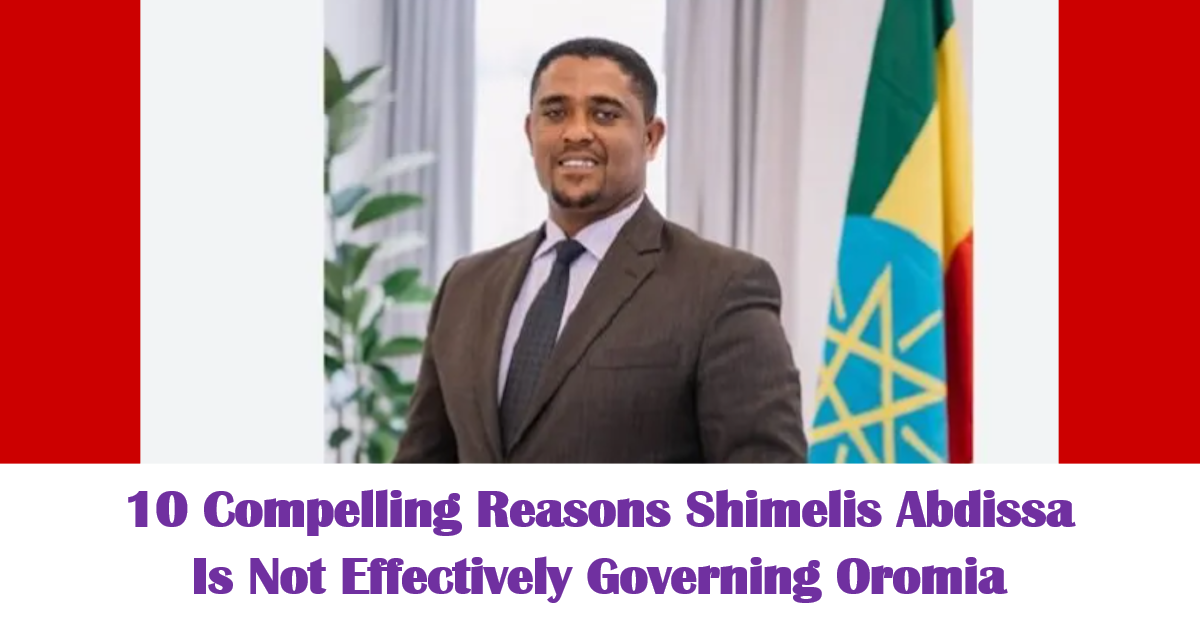
Excerpt
Shimelis Abdissa, nominally President of Oromia, has become emblematic of absentee leadership and quiet complicity in the face of tragedy, dispossession, and systemic betrayal. From his silence during national mourning to his role in dismantling Oromia’s autonomy and impoverishing its people, Shimelis serves not the Oromo nation but the pro unitary Ethiopia Prosperity Party (PP) regime. While we could come up with scores of reasons, for brevity and to get this to print, we chose 10 items that speak volumes.
Introduction
When a leader vanishes in times of crisis, silence becomes both his language and his legacy.
Oromia today is a land crying out for leadership, yet its president, Shimelis Abdissa, remains an empty shadow in moments that demand a voice, a stance, or even the faintest pretense of concern. He is neither seen nor heard when Oromia bleeds — whether from the brutal massacre of its people or the steady dismemberment of its land.
Time and again, the nation has been shaken by unspeakable tragedies — from the slaughter of the Karrayyuu Abbaa Gadaas [1] and the assassination of Battee Urgeessaa [2], to the bloodshed in Dharraa [3], and the widely reported massacres of Arsii, Jimma, Wallaga, and elsewhere.
These are not isolated horrors; they are wounds that demand the presence of a leader to comfort the bereaved and rally the nation. Yet Shimelis Abdissa does not show up — not to mourn, not to condemn, not even to pretend he cares. His silence is deafening, his absence a mark of either complicity or guilt.
The same eerie silence echoes when Oromia faces threats to its very borders. When interethnic border clashes flare in the northwest, north, east, or southeast, or when the parliament of an adjoining region declares the annexation of Oromia’s lands and towns into its own, Shimelis Abdissa offers no resistance. Nowhere to be seen.
Could it be tacit agreement? Or is it simply the indifference of a man who holds the title but not the mantle of leadership?
How can a matter as grave as the loss of Oromia’s ancestral lands draw not a single word from the man meant to protect them?
While the nation’s heart rages with outrage, its so-called leader stands mute — a bystander to both bloodshed and betrayal.
In times of tragedy, silence is cowardice. In times of territorial theft, silence is surrender. In both, Shimelis Abdissa has chosen silence, and that silence is the loudest answer to the question:
Is he truly governing Oromia?
The answer is no — Shimelis Abdissa is not governing Oromia in any meaningful sense of the word. His silence in the face of mass killings, his absence during national mourning, and his mute complicity as swathes of Oromia’s land are claimed by expansionist forces all point to a figurehead with no will, no voice, and no allegiance to the people he is meant to serve.
Below are 10 reasons why.
1. A Figurehead, Not a President
For all intents and purposes, Shimelis Abdissa’s role as “President” of Oromia is nothing more than that of a figurehead (እንደራሴ) serving Abiy Ahmed. Before occupying this role, Shimelis was stationed at the Office of the Prime Minister — and little has changed since. His move to Oromia was not a transition into independent leadership but a relocation of same loyalty. He governs nothing on his own terms. His hands are tied to the will of the central PP regime under PM Abiy Ahmed.
2. Absent in National Tragedies — Because He Is Co-Author
Shimelis Abdissa has failed to act as any responsible leader would in moments of national trauma. Consider the cold-blooded massacre of the Karrayyuu Abbaa Gadaas [1], the brutal assassination of Jaal Battee Urgeessaa [2], the chilling tragedy that unfolded in Dharraa [3] in north Tuulamaa, or the tragic death of child Simbo Birhanu [4]. These sad incidents, among dozens of others, called for a leader’s outrage, grief, and mobilization. Yet Shimelis remained mute — not due to indifference alone, but because he was among the architects of most of these atrocities. One cannot condemn what one has helped execute.
3. A Billionaire in a Land of Poverty
Shimelis Abdissa is now reportedly the richest man in Oromia — perhaps even in Ethiopia. While his people suffer, he has built wealth by brokering deals involving national resources, controlling profitable commodities and key services including Sinqee Bank.This wealth was amassed entirely after he assumed the presidency — a dramatic rise for someone who, like many of his peers from rural Oromia, came from a modest and impoverished background. Governance is not his business; profiteering is.
The same kleptocratic playbook is followed by PM Abiy and Mayor Adanech Abeebee — though their turf rarely overlaps. Adanech’s financial empire thrives on the patronage of banks and businesspeople who exchange millions for favorable permits and access.
We shall reserve a deeper look into the Prime Minister’s lucrative domains for another installment. But suffice it to say, one of his key turfs stretches from Oromia’s gold mines all the way to its international destination — a corridor of quiet exploitation masked as governance.
4. At War With His Own Freedom Fighters
The Oromo Liberation Army (OLA) is enemy number one for both Shimelis and Abiy — not because they threaten the public, but because they threaten their grip on Oromo consciousness and territory. It is a rare and tragic sight when a president wages war not on invaders, but on his own people’s liberation movement. Together, Shimelis and Abiy established a death squad [1] to hunt down OLA supporters and sympathizers.
As if the death squad weren’t enough, they went further — establishing shadowy paramilitary groups known as “Shimelis Abdissa’s Shanee” and “Abiy Ahmed’s Fano.” These covert militias exist not for defense, but to orchestrate atrocities — including grotesque massacres — only to later pin the blame on the OLA. It is violence by design, with deception as its mask.
History will judge this betrayal as nothing short of treason.
After reading this piece, one thing should be clear: the so-called peace negotiations between the PP regime and the OLA, held twice in Tanzania, were entirely disingenuous on the regime’s part [5]. For the Prosperity Party, “peace” is simply a code word for total surrender. Any genuine compromise would threaten their stranglehold on Oromia — a region where they were the sole contenders in the last election, having systematically eliminated Oromo nationalist parties through harassment, imprisonment, and targeted assassinations.
Their idea of negotiation is not mutual resolution, but submission. A recent episode — the surrender of an OLA commander who was fleeing internal disciplinary action [6]— was shamelessly paraded as proof of OLA’s collapse. But this, too, was a farce. The regime’s propaganda machine may twist narratives, but Oromo resistance is far from over — and their lies are running out of road.
Political analysts suggest that Shimelis Abdissa harbors even greater aversion to the OLA peace process than Prime Minister Abiy Ahmed himself — primarily because a genuine resolution would pose a more immediate threat to his own position. Unlike the Prime Minister, whose political survival depends on broader national dynamics, Shimelis’s authority is directly tied to maintaining control over Oromia without competition.
The near-successful round of negotiations held in Dar es Salaam, Tanzania, in November 2023, is widely believed to have collapsed at the last minute due to Shimelis Abdissa’s interference. Sources indicate that his fear of losing grip over Oromia’s political landscape outweighed any commitment to a durable peace — revealing a leader more invested in preserving personal power than ending bloodshed.
5. No Protection for Oromia’s Borders
Shimelis Abdissa has done nothing — absolutely nothing — to protect Oromia’s borders. His negligence is not passive; it is willful. See below Reason 6 for how this failure was deliberately enabled.
Border disputes involving Oromia have long been a recurring issue since the EPRDF era, but they have intensified dramatically under the current PP regime. Experts — including the former president of Oromia who preceded Shimelis Abdissa — consistently affirm that these conflicts are inherently political in nature, and therefore resolvable through principled governance and decisive leadership — both of which Oromia tragically lacks today. For more on this topic, see under Reason #10.
6. Disarming Oromia for Regime Subjugation
Under Shimelis Abdissa‘s directive, civilians across Oromia were systematically disarmed — while other regions remain heavily armed. Even rural Oromos are banned from carrying traditional sticks — items that are by no means offensive, but long used by communities to defend themselves against aggressive dogs and wild animals. This ban underscores the absurdity and paranoia of a regime that fears even the most benign symbols of rural self-reliance. This policy of total disarmament was not for peace; it was a preemptive move to prevent the rural population from siding with the OLA. Meanwhile, a carefully selected group of rogue militias and the notorious Shimelis Abdissa’s Gachana Sirna were empowered to extort businesses and enforce loyalty through intimidation.
The consequences of Oromia’s complete disarmament are catastrophic: civilians along Oromia’s borders now die trying to defend their land with bare hands. Meanwhile, the federal Nd regional regimes spare no resources when it comes to deploying security forces—police, special units, and the military—all concentrated on crushing the OLA. Expansionist forces in the northwest, north, east, and southeast enjoy free rein to encroach, loot, and claim territory — with no challenge from the Oromia administration. One is forced to ask: what is the Oromia presidency actually for?
7. Systematic Economic Abuse of Rural Oromia
It is no exaggeration to say that Shimelis Abdissa is a one-man operation to economically strangle Oromia’s 85% rural population. Instead of lifting up farmers, he has bled them dry through manipulative market controls. His administration buys wheat at fixed, below-market prices and sells it to aid organizations at inflated rates — a cruel twist that turned farmers into tools for regime profiteering.
The Prime Minister then padded the books to tout wheat “exports” built on this theft. In 2022-23, for example, farmers were forced to sell wheat worth around 7,000 Birr at 3,200 Birr. With the soaring costs of agricultural inputs like fertilizer and weed killers, these farmers operate at a net loss year after year — while regional and federal elites rake in billions [7].
There is far more to the economic suffering of Oromia’s rural communities than space here allows [8] — but one glaring injustice demands to be singled out. In a disturbing echo of the imperial past, Shimelis Abdissa has effectively revived the exploitative practices of Emperor Menelik II’s occupation forces — the Nafxanyas, or rifle-bearers — who once lived off the Oromo communities for their subsistence and free labor.
Today, rural households are being ordered to provide food or financial contributions to militia forces under the guise of local “support.” Those unable to meet these coercive demands face harsh punishment, intimidation, or worse. This is not governance — it is extraction, a modern-day feudalism masked in regional authority.
Update [2025-08-07]: As if the above gross economic abuse is not enough, only recently Shimalis Abdissa remarked not to pay any compensation in future for land expropriation for for public projects [9]. It defeats description what is administration is up to and if they are tasked to do the opposite of what the public expects them to do.
In a 19 July, 2025, address to the Oromia Regional State Council, he made the following controversial remark concerning land acquired for public projects:
“In the past, we didn’t know about paying compensation, and we won’t pay it in the future either.”
8. From Protectors to Dismantlers of Oromia
Shimelis and Abiy have done far more to dismantle Oromia than to protect it. Calling them Ijoollee Abbaa Gadaa is a disgrace to that legacy. What they do amounts to high treason. Through the shadow operations of Koree Nageenyaa, the federal-sanctioned “Oromia Administration,” and parallel forces like “Shimelis Abdissa’s Shanee” and “Abiy Ahmed’s Fano“, Abiy and Shimelis are busy sabotaging the very existence of Oromia — not for any vision, but purely to cling to power [10]. What kind of leaders conspire to hollow out the heart of their own nation?
9. The Grand Betrayal: Dissolving Multinational Federalism in the Offing
The final blow comes in the form of a sinister federal agenda: the dismantling of Oromia itself. Shimelis Abdissa and Abiy Ahmed are preparing to roll out the dissolution of Multinational Federalism, beginning with the fragmentation of Oromia into artificial administrative clusters — all under the guise of “constitutional reform and national unity” [11,12,13].
This agenda is being driven by the Ethiopian National Dialogue Commission (ENDC) [14], a deeply controversial body whose commissioners were handpicked by the Prime Minister. Major Oromo nationalist parties have boycotted the process, not only due to its undemocratic structure but also because of the Commission’s blatant bias toward Unitarist agendas.
No genuine Oromo leader would ever participate in such a historic rollback of hard-won rights since the 1995 constitution of multi-national federation. This isn’t just a betrayal — it is the most aggressive anti-Oromo regime since the imperial conquests of Menelik II. In terms of death toll and cultural sabotage, the PP regime under Abiy and Shimelis is orders of magnitude worse than the EPRDF — and certainly no friend of Oromia.
The imperial regimes of Menelik II and Haile Selassie pursued identity erasure through sweeping assimilation policies and the deliberate partitioning of Oromo territory — all aimed at neutralizing Oromo unity. Yet, within a few decades, a powerful renaissance of Oromo nationalism emerged, ultimately contributing to the downfall of the brutal EPRDF regime after 27 years in power. Today, camouflaged under a banner of the “Oromo government”, Shimelis Abdissa and Abiy Ahmed, in concert with their Unitarist collaborators, are reviving that very imperial blueprint — this time through the fragmentation of Oromia into clusters akin to the imperial era provinces. But history has shown: Oromo unity may bend, but it does not break. They will not succeed.
10. Oromia as a Chessboard: The Silence That Reveals the Game
This final point — the one that compelled us to compile this entire list — centers on a chilling and revealing silence: the utter lack of response from President Shimelis Abdissa following the Somali region’s formal declaration [15], just four days ago, of annexing Moyale town and additional areas of Oromia. The silence has undoubtedly stunned the nation.
What are we to make of it? The answer lies in a deeply cynical political playbook: Oromia is being used as a chessboard by Shimelis Abdissa and his superior, Prime Minister Abiy Ahmed — not to defend its people, but to manipulate narratives, to create diversionary fires whenever pressure mounts.
This tactic is not new. The former EPRDF regime routinely used inter-ethnic tensions as a tool of divide and rule, often engineering conflicts through political proxies before stepping in as self-styled peace arbiters. The goal has always been clear: to weaken and control Oromia, the resource-rich economic heartland of the empire coveted by all. With no real cost to the TPLF at the helm of EPRDF, Oromia’s territory was systematically carved up and handed to neighboring regions — most notably the east Borana zone part of Liban, which ironically now serves as a corridor for the further annexation of Moyale.
But under the PP regime, this strategy has been taken to sinister new depths — driven by an unmatched contempt for the Oromo people and their national aspirations.
Take the recent launch of the Oromo National Dialogue (OND) [16]— a historic online initiative that began on 19 July 2025 and quickly gained traction among Oromo communities worldwide.
The regime’s response? Trigger a headline-grabbing crisis to overshadow it. In this case, the play was simple: greenlight the Somali regional head and parliament to declare annexation of parts of Oromia, including Moyale. It was calculated, coordinated, and executed with federal knowledge — as even the state-run broadcast media carried the announcement [15], signaling tacit approval at the highest levels.
This is not an isolated tactic. Whenever OLA pressure intensifies — politically, militarily, or symbolically — the regime resorts to engineered outrage. Recent examples include the killing of monks on Mount Cuqaala, the massacres in Arsii, Wallaga, and north Tuulamaa, and, most viscerally, the grotesque annihilation of an Oromo institution in mere seconds — the cold-blooded assassination of 14 Karrayyuu Abbaa Gadaas during a ceremonial ritual. All of these were staged operations, later falsely pinned on the OLA to demonize the movement and fracture Oromo unity.
These incidents are then amplified by the regime’s media machinery and their handsomely salaried cyber armies, including the opportunistic volunteers known as Faarseebulaas [17] — keyboard and microphone loyalists who spin atrocity into narrative.
Ultimately, what we’re witnessing is the desperate theatre of a grand delusion: Shimelis Abdissa playing kingmaker, Abiy Ahmed chasing a crown born of chaos. It is, quite literally, Shakespearean — except the stage is Oromia, and the blood is real.
This most recent incident — the Somali region’s audacious claim over Oromo land — was not a rogue act. It was strategically timed, federally endorsed, and regionally unopposed.
And the most damning part? No official response has come from Shimelis Abdissa or Abiy Ahmed. Not a statement. Not a clarification. Not even a denial. Four day have passed since as we publish this piece, and no word.
So we ask: What explanation do you offer, Prime Minister Abiy and President Shimelis?
How does a subordinate region unilaterally vote in its parliament to absorb towns from another regional state — without your awareness or intervention?
Is this the “Free Oromia” you proclaimed in Naqamte Stadium [18] in 2024?
Or is that just another stage performance, another lie?
Until answers come — and they won’t — we’re left with silence. A silence that speaks louder than any proclamation.
Finally…
We leave you with a simple challenge: Can you name a single positive contribution that President Shimelis Abdissa has made to Oromia or the Oromo people? We suspect the answer is as silent as the man himself in times of crisis.
Some may point to the recently inaugurated KEENYA beer factory — unveiled with glittering fanfare and sold as a boost for youth employment. But let us be clear: an alcoholic beverage is not a national priority in a region grappling with poverty, dispossession, and mass trauma. If anything, it reflects the regime’s distorted sense of development — promoting intoxication where education, healthcare, and justice are desperately needed.
In the final analysis, Shimelis Abdissa’s tenure has been marked not by leadership, but by absence, complicity, and betrayal. And while we could present scores of reasons, for the sake of brevity and to bring this to press, we chose 10 — each one a mirror to the truth he refuses to face.
References
- GIULIA PARAVICINI, In Ethiopia, a secret committee orders killings and arrests to crush rebels, A REUTERS INVESTIGATION, 23 February 2023, Reuters.
- OT Editorial, Battee Urgeessaa Is Gone, Who Will Be Next For Koree Nageenyaa's Gestapo?, 11 April 2024, OROMIA TODAY.
- Roobaa Hawwaas, The Case Against President Shimelis Abdisa: When Admission Demands Resignation, 28 November 2024, OROMIA TODAY.
- Elemoo Qilxuu, When Those Who Should Protect You Become the Perpetrators, 2 February 2025, OROMIA TODAY.
- Elemoo Qilxuu, A Missed Opportunity for Peace in Oromia, 22 November 2023, OROMIA TODAY.
- OT Editorial, Oromia PP-Speak Decoded: Peace as Surrender in Oromia, plus One Defector, One Photo Op, 1 December 2024, OROMIA TODAY.
- Kumaa Daadhii, Ten Things the PP Government Has Done—and You Might Not Even Know, 25 January 2025, OROMIA TODAY
- OT Editorial, Oromia’s Endemic Corruption is Set to Impoverish the Already Poor Farmers, 20 January 2023, OROMIA TODAY.
- Hassen Mama Muse, “No Compensation, No Justice: Oromia President’s land confiscation remark challenges constitutional order, threatens property rights”, 31 July 2025, Addis Standard.
- Olii Boran, Leading by Chaos, Not Competence, 4 December 2024, OROMIA TODAY.
- OT Editorial, The Death of Federalism by Agenda, 6 June 2025, OROMIA TODAY.
- OT Editorial, Sleepwalking into the Tyranny of Geography, 13 June 2025, OROMIA TODAY.
- OT Editorial, Daniel Kibret’s Delusional Word Games for Unitarism, 16 June 2025, OROMIA TODAY.
- OT Editorial, To the Ethiopian National Dialogue Commission: You Are Wasting Your Time and Everyone Else’s, 31 January 2025, OROMIA TODAY.
- የሶማሊ ክልል ምክር ቤት አዲስ የአስተዳደራዊ መዋቅር ክለሳ እንዲደረግ በአብላጫ ድምፅ ወሰነ, (Ethiopian Broadcasting Corporation’s pos), Facebook.
- OT Editorial, What the Oromo Dialogue Online Tells Us About Missed Opportunities, Unity, and the Fight for Identity, 20 July 2025, OROMIA TODAY.
- Olii Boran and Ed Chapman, Digital Serfdom in Ethiopia: Faarseebulaa, Propaganda, and the Politics of Praise, 22 May 2025, OROMIA TODAY.
- Elemoo Qilxuu, The Brazen Arrogance of Idiotic Charlatans: Claiming Credits They Never Owned, 9 May 2024, OROMIA TODAY.

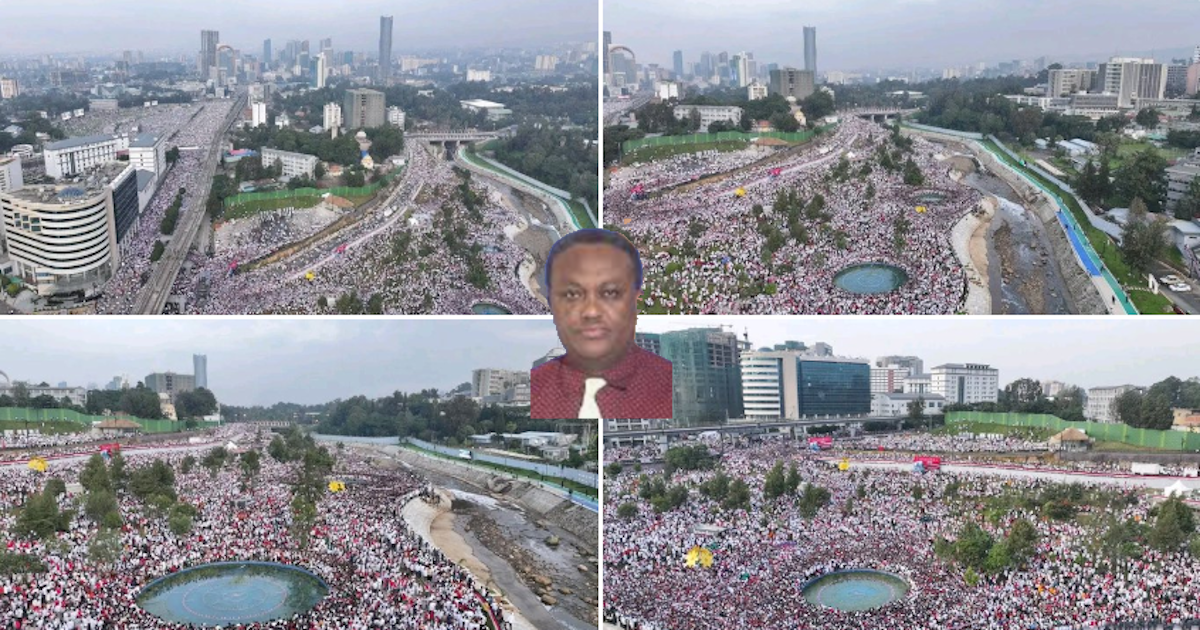
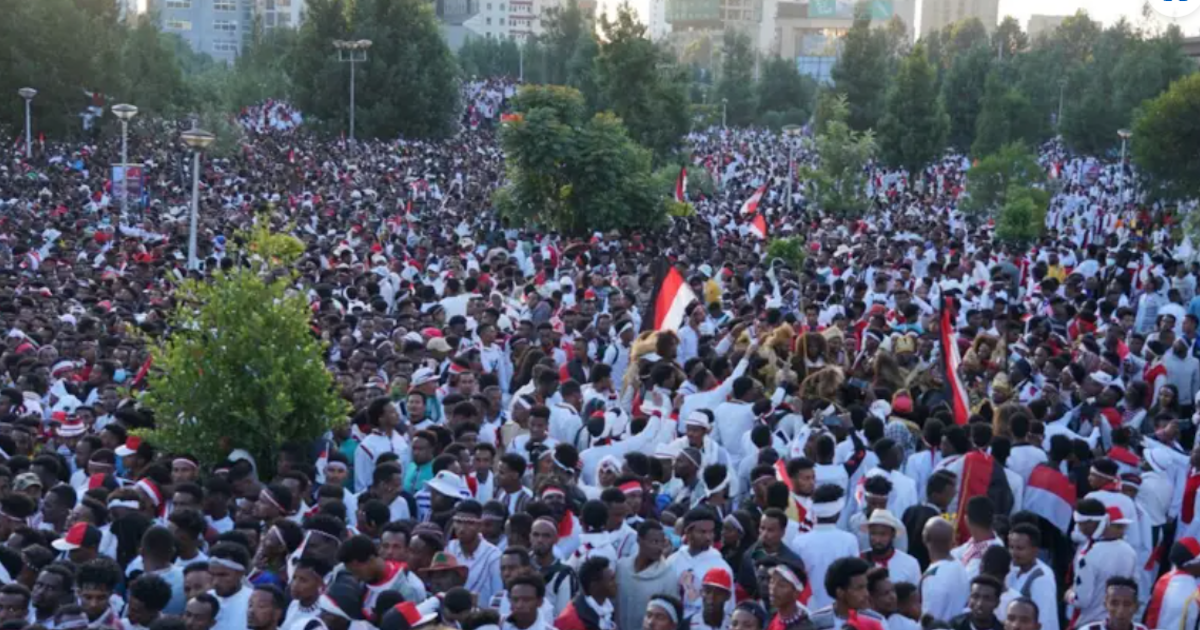
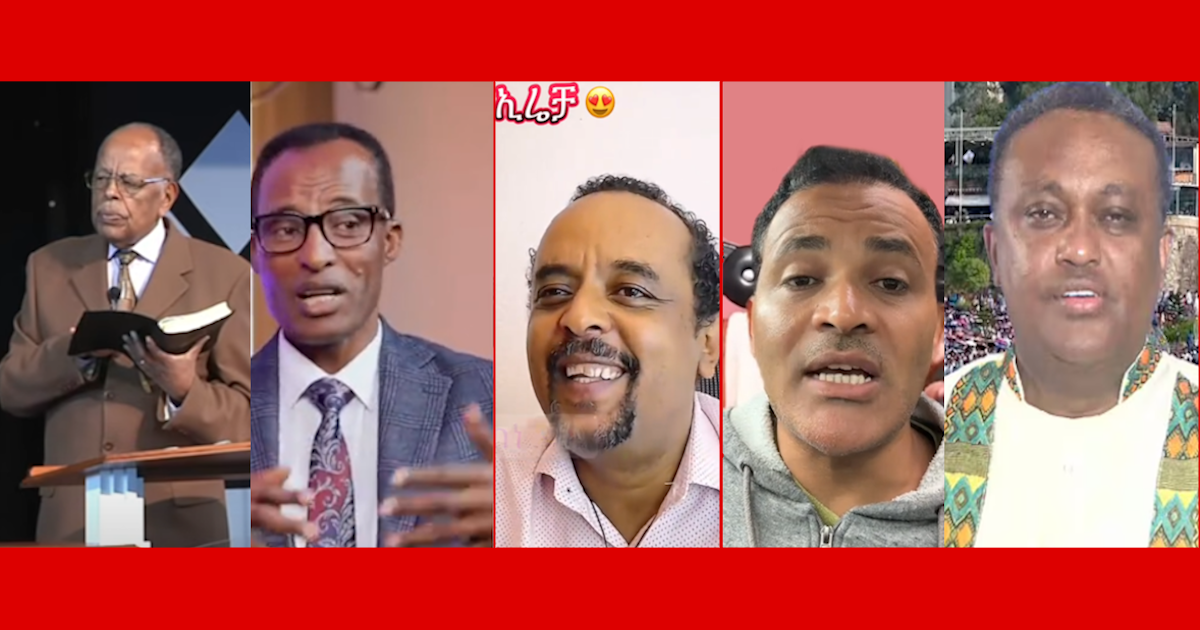
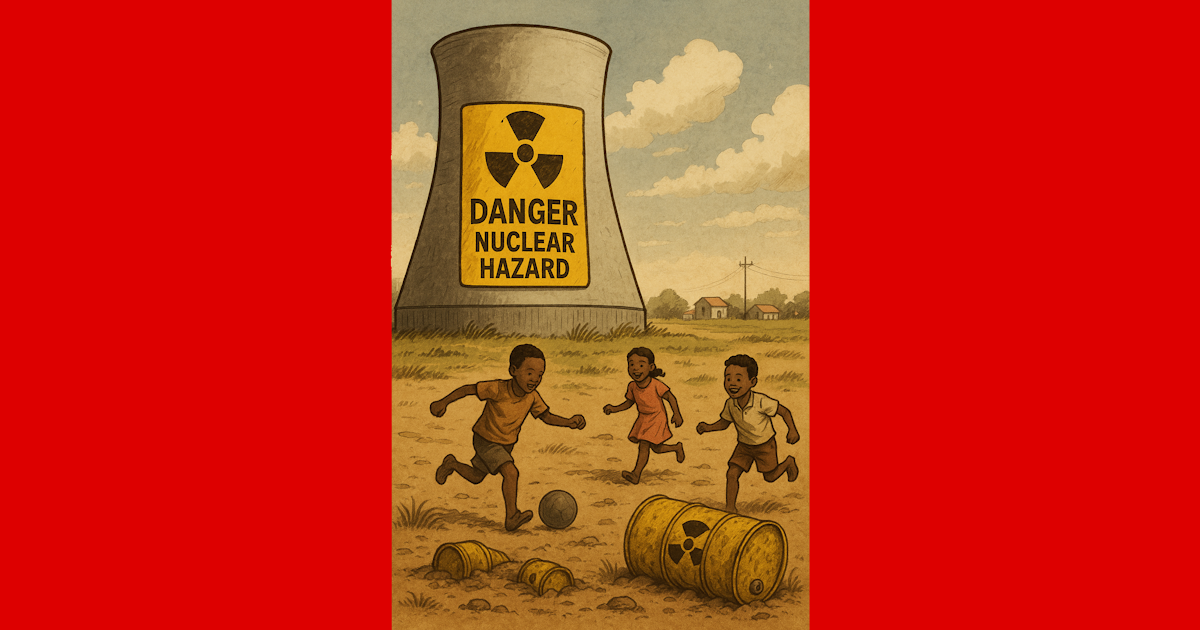
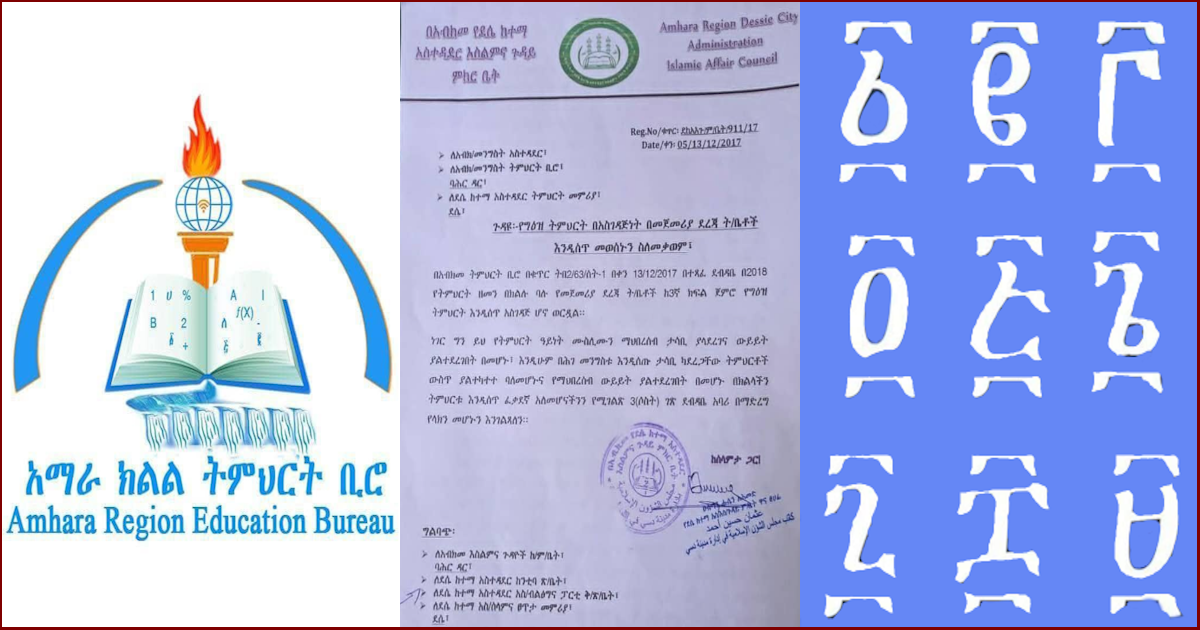
Well articulated